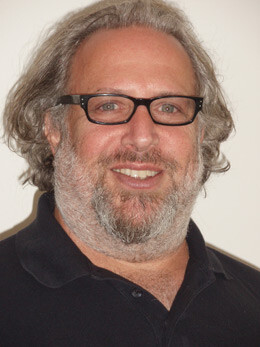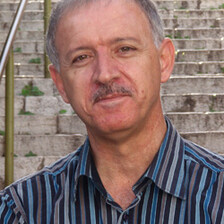The Electronic Intifada 24 May 2010

Udi Aloni (Adri Nieuwhof)
Adri Nieuwhof: Can you tell the readers about yourself?
Udi Aloni: I am a filmmaker, a writer and activist. I am on the advisory board of Jewish Voice for Peace in the United States. I am a cinema coach in the Freedom Theatre in Jenin [in the occupied West Bank].
I am a Jewish citizen of Israel and the United States, working a lot with my Jewishness and trying to redefine it. I am not happy at all with my Israeliness. I try to be optimistic in my actions, and not to fall into bitterness. Bitterness will block our actions.
My most recent film is about the Jammu Kashmir Liberation Front in India. I am not allowed in India anymore. Interestingly, India is one of the biggest arms trade partners of Israel. India uses the same tactics against the Kashmir people as Israel does against the Palestinians.
The challenge for me is how to combine art, theory and action. People find theory paralyzing. Academics have sophisticated texts about resistance but leave the debate in an isolated context. Art that is “free from ideology” really serves the hegemonic ideology. Art can, but does not have to, promote action. It is about combining the three, each part should be a means for the other and at the same time an aim in itself.
AN: Can you give an example of how you combine art, theory and action in your work?
UA: During my action at the demonstrations in Bilin [in the occupied West Bank], I show my solidarity with my body, standing shoulder to shoulder with Palestinians and Israelis against the soldiers. [The demonstrations include] queer people and religious people. It is the opening of binationalism. Not too much theory.
An example of how I am trying to combine art, theory and action is my new book What does a Jew want [to be published next spring by Columbia University Press]. The book is an opening to Edward Said’s Freud and the non-European. I use the text to try to understand the context I work in. To understand binationalism, my dream. Binationalism is not about a legal decision. In the second part of my book I fight against the national Jewish left, to show how they are part of the occupation. A third part [takes up] my art, and the last part is dialogues with Slavoj Zizek, Alain Badiou and Judith Butler.
Another place where I try to combine art, theory and action is in the Jenin refugee camp. Because I joined fully the BDS movement, I was accepted in Jenin. As a cinema coach I give my skills in support of the Freedom Theatre. We are working on Antigone. For us, the fight to liberate Palestinians and the fight for women’s rights go hand in hand. A freedom fighter fights for all freedoms. This is how I try to combine art, theory and action.
AN: Can you discuss the support for the BDS among Jews in Israel?
UA: There is a group that supports the BDS, they are my friends but I have not been to their meetings. I feel that some of the people involved are true righteous people. You see them at protests in Bilin, in Sheikh Jarrah, they assist Sudanese refugees, they go out to support workers in factories. They are truly committed, always in the right place.
I concentrate mostly on the academic and cultural boycott. When the Canadian author Naomi Klein came to Palestine she said, I am ashamed it took me this long to join the BDS. I had another process to overcome the opposition within me.
I remember the exact moment I joined the academic and cultural boycott. On 7 January 2009, I was jogging in Tel Aviv and passed the Bialik House museum. Hayyim Nahman Bialik was a national Israeli poet. That day Bialik’s house would be inaugurated, champagne glasses were standing on tables outside, waiting for the guests. President Shimon Peres would attend the opening. On my walkman I heard the news about the bombing of a school in Gaza. And at the same time they are going to toast on the opening of Bialik’s house with Peres? I thought. Bialik wrote the famous poem “In the City of Slaughter,” about the anguish at the situation of Jews at the time of the pogroms in Russia. I felt a deep disgust. That moment I decided: no more discussions. No drinking champagne with Peres, a war crimes suspect. It is time for clarity; who is on this side and who on that side. The other side are the ambassadors of the occupation. I phoned some poet friends and we protested loudly from across the street [video of the demonstration is on YouTube].
AN: Palestinian leaders in Israel Ameer Makhoul and Omar Said were arrested. Can you comment on this?
UA: I would say, if people felt there wasn’t a reason to boycott Israel, there is a reason now. In Israel, it started with stories about Azmi Bishara, [the former parliamentarian forced into exile]. We could not create sufficient resistance then. Israel wants to destroy the honest, truthful leadership. They went after two true human rights activists. It is like arresting [former South African President Nelson] Mandela. How can Elton John now play in Israel, when human right activists Ameer Makhoul and Omar Said are in prison? Israel wants to destroy Palestinians in Israel. Israel is run by people who want to create ethnic cleansing. It feels like they waiting for the moment to push the Palestinians out. The international community has to act now. Kafka once wrote: “The Messiah will come one day after his arrival,” maybe this time we should try to come on time to fight and help the cause which Ameer and Omar are fighting for.
Adri Nieuwhof is a consultant and human rights advocate based in Switzerland.





